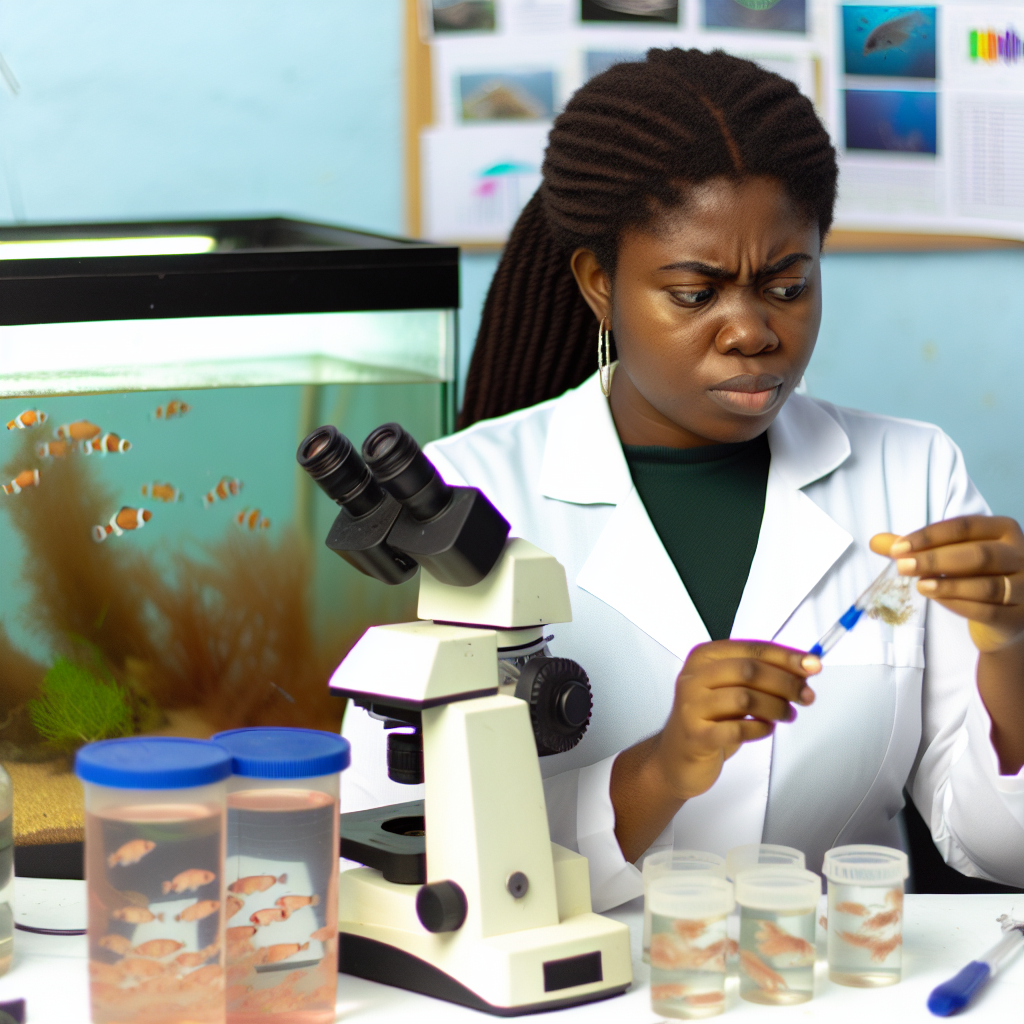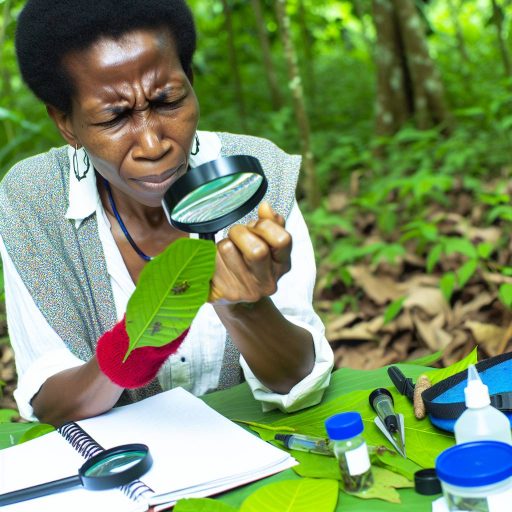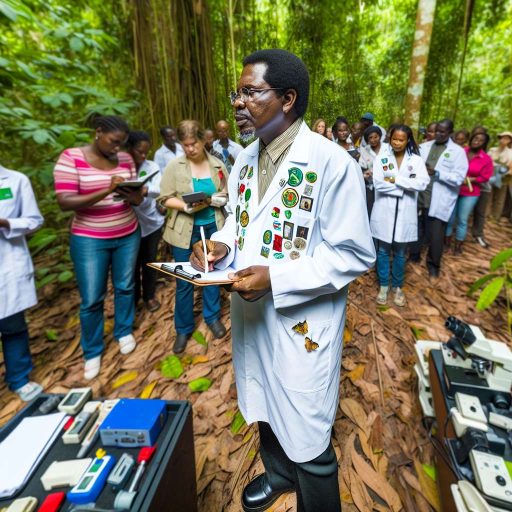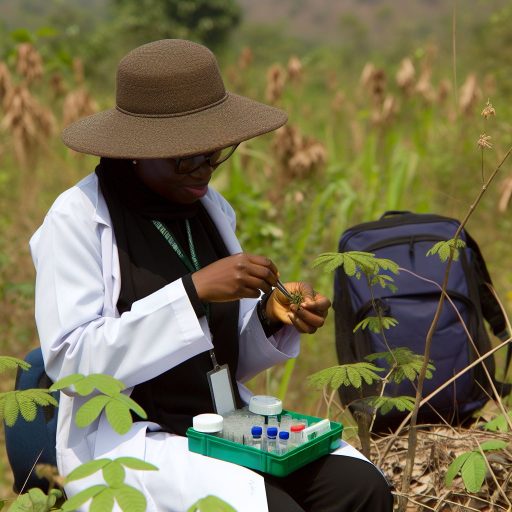Introduction:
Brief overview of Nigerian Fisheries and Marine Biology research: Nigerian Fisheries and Marine Biology research focuses on studying the diverse aquatic life in Nigerian waters, including fish species, marine ecosystems, and their interactions.
Importance of this research in the context of Nigerian economy and sustainable development: Fisheries are a crucial sector in Nigeria, providing food security, employment, and income for many communities. Understanding marine biology helps to sustainably manage resources for future generations.
Overview of Nigerian Fisheries:
Description of the fishing industry in Nigeria
Nigeria has a rich and diverse fishing industry that plays a crucial role in the economy.
The sector is largely dominated by small-scale artisanal fishermen who operate in both inland waters and coastal areas.
These fishermen use traditional methods such as canoes and nets to catch fish, while larger commercial vessels are also present in Nigerian waters.
Key species of fish found in Nigerian waters
Nigerian waters are home to a wide variety of fish species, both freshwater and marine.
Some of the key species that are commonly found in Nigerian waters include tilapia, catfish, mackerel, snapper, and tuna.
These fish are not only important for local consumption but also play a significant role in the export market.
Challenges facing the Nigerian fisheries sector
Despite its vast potential, the Nigerian fisheries sector faces several challenges that hinder its growth and sustainability.
One of the major issues is overfishing, which has led to a decline in fish stocks and threatens the livelihoods of fishermen.
Pollution and habitat degradation are also significant problems that impact fish populations and the overall health of marine ecosystems.
Other challenges include lack of proper infrastructure and equipment, inadequate regulatory framework, illegal fishing practices, and the effects of climate change.
These issues combined pose a serious threat to the future of the Nigerian fisheries sector and require immediate attention and action from stakeholders and policymakers.
List of Research Institutes and Universities Conducting Marine Biology Research
Nigerian Institute for Oceanography and Marine Research (NIOMR) is one of the leading research institutes in Nigeria that focuses on marine biology research.
University of Lagos has a strong marine biology research department that conducts various research projects.
Federal University of Agriculture, Abeokuta also has a marine biology research unit that contributes to the field.
University of Port Harcourt is known for its research in marine biology and conservation.
Nigerian Maritime University, Okerenkoko specializes in marine-related research, including marine biology.
Current Research Projects and Findings in the Field
Study on the Impact of Climate Change on Marine Ecosystems. Researchers are investigating how climate change is affecting marine life in Nigerian waters.
Biodiversity Assessment of Nigerian Coastal Areas. A project is underway to assess the biodiversity of Nigerian coastal regions and its impact on marine ecosystems.
Sustainable Fisheries Management Strategies. Researchers are developing strategies to ensure the sustainability of fisheries in Nigeria.
Marine Pollution and Its Effects on Marine Life. Studies are being conducted to understand the sources and effects of marine pollution in Nigerian waters.
Conservation of Endangered Marine Species. Efforts are being made to protect endangered marine species in Nigerian waters through conservation programs and research.
Collaboration with International Research Institutions
Collaboration with NOAA. The Nigerian Institute for Oceanography and Marine Research collaborates with the National Oceanic and Atmospheric Administration (NOAA) on research projects.
Partnership with University of California, Berkeley. Nigerian universities are working with UC Berkeley on joint research initiatives in marine biology.
Exchange Programs with Marine Research Institutes in Europe. Nigerian researchers participate in exchange programs with marine research institutes in Europe to share knowledge and expertise.
Joint Projects with Australian Marine Science Institutions. Collaborative projects between Nigerian and Australian marine science institutions further research in marine biology.
Research Grants from International Organizations. Nigerian researchers often receive research grants from international organizations to fund marine biology research projects and initiatives.
Uncover the Details: Environmental Management Tech Conferences in Nigeria
Impact of Fisheries and Marine Biology Research
Fisheries and Marine Biology Research play a crucial role in maintaining the balance of marine ecosystems and sustaining fish populations.
This research helps in understanding the dynamics of aquatic life and the impact of human activities on marine environments.
Contribution to sustainable fisheries management
- Research provides valuable insights into the behavior and distribution of fish species, enabling better management of fisheries resources.
- Scientific data helps in setting catch limits, implementing conservation measures, and monitoring fish populations to ensure sustainable fishing practices.
- Studies on fish biology and habitat preferences contribute to the development of effective fishery management plans that aim to prevent overfishing and protect endangered species.
- By understanding the reproductive cycles and migration patterns of fish, researchers can promote sustainable harvesting practices that support the long-term health of fish populations.
Influence on policy making and conservation efforts
- Research findings are used by policymakers and conservationists to shape regulations and policies aimed at protecting marine ecosystems and biodiversity.
- Scientists provide scientific evidence to support the establishment of marine protected areas, fishing quotas, and other conservation measures to safeguard fish populations and their habitats.
- Studies on the impact of pollution, climate change, and other environmental stressors on marine life help in identifying threats to fisheries and developing strategies to mitigate their effects.
- Through collaboration with government agencies and non-profit organizations, researchers can advocate for sustainable fishing practices and conservation initiatives based on scientific research.
Economic benefits of research in terms of increasing fish production and exports
- Research leads to the development of innovative aquaculture techniques and technologies that enhance fish production and contribute to food security and economic growth.
- Studies on fish genetics, nutrition, and health help in improving the quality and quantity of farmed fish, expanding market opportunities, and increasing export revenues.
- By identifying new fish species with commercial potential and exploring sustainable fishing practices, researchers support the growth of the fishing industry and create employment opportunities.
- Research on market trends, consumer preferences, and trade regulations enables policymakers and industry stakeholders to make informed decisions that promote the sustainable development of fisheries and enhance international trade.
Fisheries and Marine Biology Research play a vital role in promoting sustainable fisheries management, influencing policy making, and conservation efforts, and contributing to economic benefits through increased fish production and exports.
By combining scientific knowledge with practical applications, researchers help to safeguard marine resources for future generations.
You Might Also Like: Ecotourism Opportunities in Nigeria
Challenges and Opportunities:
Identification of major challenges facing fisheries and marine biology research in Nigeria
Limited funding for research projects related to fisheries and marine biology.
Insufficient infrastructure and equipment for conducting in-depth research.
Lack of skilled personnel and experts in the field of fisheries and marine biology.
Inadequate data collection and analysis, which hinders the development of effective strategies.
Opportunities for growth and development in the sector
Increasing demand for fish and seafood products both domestically and internationally.
Potential for sustainable aquaculture practices to enhance production.
Transform Your Career with Expert Guidance
Get personalized mentorship consulting that’s tailored to your unique path. Our expert advice is actionable and exclusive.
Get StartedCollaboration with international organizations for knowledge exchange and capacity building.
Rising interest in marine conservation and sustainable resource management.
Role of technology and innovation in overcoming challenges
Use of satellite technology for monitoring fish stocks and tracking fishing vessels.
Implementation of advanced aquaculture techniques to increase production efficiency.
Adoption of DNA barcoding for species identification and conservation efforts.
Development of mobile applications for data collection and dissemination among researchers.
Find Out More: Environmental Management and Climate Change in Nigeria

Case Studies:
-
Highlight of successful research projects in Nigerian Fisheries and Marine Biology
Given the rich biodiversity of Nigerian waters, several research projects have been conducted in the field of fisheries and marine biology.
These projects have focused on various aspects such as species conservation, ecosystem health, and sustainable fishing practices.
One notable success story is the research project conducted by a team of researchers from the University of Lagos, which focused on the conservation of endangered fish species in the Niger Delta region.
Through their efforts, they were able to identify key breeding grounds and migration patterns of these species, leading to the development of conservation strategies that have significantly increased their population numbers.
Another successful research project was led by a team of marine biologists from the Nigerian Institute of Oceanography and Marine Research (NIOMR).
This project aimed to assess the impact of pollution on marine life along the Nigerian coastline.
The researchers found that certain pollutants were significantly affecting the health of marine ecosystems, leading to the development of policies and regulations to mitigate these effects.
-
Showcase of innovative solutions and methodologies used in research
Innovative solutions and methodologies are essential in advancing research in Nigerian fisheries and marine biology.
Researchers have utilized cutting-edge technologies such as DNA barcoding and satellite tagging to track fish populations and monitor their movements.
These technologies have provided valuable insights into the behavior and distribution of various species, enabling researchers to develop more effective conservation strategies.
One innovative solution that has been widely adopted in Nigerian fisheries research is the use of underwater drones for underwater surveys.
These drones can capture high-resolution images and videos of marine ecosystems, allowing researchers to study fish behavior and habitat preferences in unprecedented detail.
This technology has revolutionized the way we conduct research in the field, providing a wealth of data that was previously inaccessible.
-
Testimonials from researchers and stakeholders in the field
Researchers and stakeholders in the field of Nigerian fisheries and marine biology have expressed their satisfaction with the progress made in research projects and the impact they have had on conservation efforts.
Dr. Oluwaseun Ojo, a marine biologist at the University of Lagos, praised the collaborative nature of research initiatives and the dedication of researchers to protecting the marine environment.
Stakeholders such as local fishermen and government agencies have also recognized the importance of research in informing policy decisions and sustainable fishing practices.
Mr. Ibrahim Abdullahi, a local fisherman in the Niger Delta region, noted how research projects have helped improve fish stocks and ensure the long-term viability of fishing communities.
Research in Nigerian fisheries and marine biology plays a vital role in understanding and protecting the rich marine biodiversity of the region.
Through successful research projects, innovative solutions, and strong collaboration between researchers and stakeholders, significant strides have been made in preserving our marine ecosystems for future generations.
You Might Also Like: Essential Skills for Estate Management Students
Significance of Nigerian Fisheries and Marine Biology Research
Recap of the importance of Nigerian Fisheries and Marine Biology research: Nigerian Fisheries and Marine Biology research plays a critical role in understanding and managing the aquatic ecosystems in Nigeria.
This research helps in sustaining the fisheries industry, conserving marine biodiversity, and promoting sustainable fishing practices.
Call to action for continued support and funding for research initiatives: It is essential to continue supporting and funding Nigerian Fisheries and Marine Biology research to ensure the long-term sustainability of the fisheries sector.
By investing in research initiatives, we can address pressing environmental issues, develop effective management strategies, and enhance the resilience of fish stocks to climate change and overfishing.
Future prospects and potential for growth in the sector: There is vast potential for growth in the Nigerian Fisheries and Marine Biology sector.
By leveraging research findings, implementing science-based management approaches, and enhancing collaboration between the government, research institutions, and industry stakeholders, Nigeria can further develop its fisheries sector.
This development can create employment opportunities and improve food security.
Additional Resources
Nigerian Institute for Oceanography and Marine Research: NIOMR
Investigating Fishing Impacts in Nigerian Coastal Waters Using …




